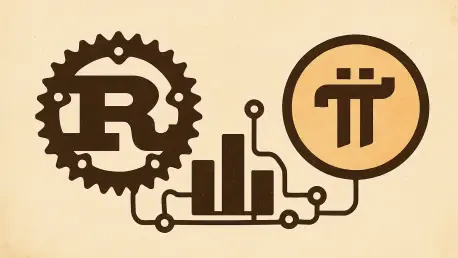In an era where decentralized technologies are reshaping the digital landscape, the announcement of the Pi Network Rust SDK on October 7, 2025, by @fanlujun2247 marks a significant milestone for Web3 developers. This cutting-edge software development kit, crafted with the high-performance Rust programming language, is poised to transform how developers interact with Pi Network’s APIs and build decentralized applications. With its promise of unparalleled speed, robust safety features, and seamless integration with the Stellar blockchain, the SDK emerges as a pivotal tool in the rapidly evolving world of cryptocurrency and blockchain innovation. Beyond mere technical utility, it reflects a broader vision of fostering a transparent and equitable digital economy, challenging traditional financial models with a focus on contribution and participation. As developers worldwide anticipate its release, the SDK stands as a beacon of potential, ready to empower creators to tackle the complexities of Web3 with confidence and creativity.
Technical Innovations of Pi Network Rust SDK
Performance and Safety with Rust
The choice of Rust as the foundation for the Pi Network Rust SDK is a deliberate and strategic decision, tapping into the language’s renowned strengths in memory safety and concurrency. Unlike other programming languages that often struggle with issues like memory leaks or runtime errors, Rust offers a safeguard against such pitfalls, which are especially critical in the high-stakes realm of blockchain development. This means that applications built with the SDK can achieve exceptional speed without sacrificing reliability, a balance that developers have long sought in decentralized systems. By prioritizing performance, the SDK ensures that even complex transactions and data processing tasks are handled efficiently, setting a new standard for what developers can expect when crafting solutions for Web3 environments.
Moreover, the safety features inherent in Rust empower developers to build with confidence, knowing that common vulnerabilities are mitigated from the outset. The language’s strict compile-time checks prevent many errors before they can manifest, reducing debugging time and enhancing the overall stability of applications. This is particularly vital in the context of cryptocurrency, where a single flaw can lead to significant financial losses or security breaches. The SDK’s reliance on Rust not only addresses these technical concerns but also aligns with an industry-wide shift toward languages that prioritize both speed and security, positioning it as a forward-thinking tool for modern blockchain challenges.
Async-First Architecture and Type Safety
A standout feature of the Pi Network Rust SDK is its async-first architecture, designed to support the creation of highly responsive applications capable of managing real-time data with ease. In the fast-paced world of Web3, where transactions and interactions often demand immediate processing, this design ensures that applications remain fluid and efficient under pressure. Developers can leverage this capability to handle multiple tasks concurrently without bottlenecks, making the SDK an ideal choice for building dynamic decentralized platforms. This focus on responsiveness addresses a core need in blockchain development, where delays can disrupt user experience and hinder adoption.
Equally important is the SDK’s emphasis on type safety, a feature that significantly reduces the likelihood of bugs by catching potential errors early in the development cycle. By enforcing strict data type rules, it minimizes the risk of runtime issues that could compromise application integrity, a concern that looms large in decentralized environments. This reliability translates to a smoother development process, allowing coders to focus on innovation rather than troubleshooting. The combination of async-first design and type safety creates a robust framework that not only enhances performance but also streamlines the journey from concept to deployment in Web3 projects.
Strategic Vision for Web3 Expansion
Bridging Traditional and Decentralized Economies
The Pi Network Rust SDK transcends the boundaries of a mere technical tool, embodying a transformative mission to redefine value within the digital economy by promoting contribution-based models over traditional financial structures. By facilitating seamless integration with Pi Network’s ecosystem and the Stellar blockchain, it acts as a conduit between established financial paradigms and the emerging world of decentralized systems. This bridging capability allows developers to create applications that cater to both conventional users and those embracing Web3, fostering a gradual transition toward more inclusive economic models. The SDK’s design reflects a deep understanding of the need to balance familiarity with innovation, ensuring that the shift to decentralization feels accessible rather than disruptive.
Furthermore, this strategic alignment with Pi Network’s vision positions the SDK as a catalyst for systemic change, encouraging applications that reward active participation and creativity rather than passive ownership. Such a focus resonates with the core principles of Web3, where empowerment and equity take precedence over centralized control. Developers utilizing the SDK can explore new ways to generate value, whether through peer-to-peer transactions or community-driven initiatives, thereby contributing to a digital landscape that prioritizes fairness. This approach not only addresses current economic disparities but also paves the way for a future where technology serves as a tool for broader societal benefit.
Open-Source Collaboration and Community Impact
Central to the ethos of the Pi Network Rust SDK is its open-source framework, a feature that underscores a commitment to transparency and inclusivity in the Web3 space. By making the SDK accessible to a global community of developers, Pi Network invites collaboration and input from diverse perspectives, ensuring that the tool evolves to meet a wide array of needs. This collaborative spirit mirrors a broader trend in decentralized technologies, where community-driven innovation is seen as essential for building trust and fostering adoption. The open-source nature of the SDK thus becomes a powerful mechanism for uniting coders worldwide in the shared goal of advancing blockchain solutions.
In addition to promoting collaboration, the community-centric approach of the SDK has profound implications for the Web3 ecosystem at large. It encourages a culture of collective progress, where individual contributions shape the tool’s future while benefiting the entire developer base. This dynamic not only accelerates innovation but also builds a sense of ownership among participants, reinforcing the decentralized ethos of shared governance. As developers from varied backgrounds contribute code, ideas, and feedback, the SDK stands to become a truly global resource, reflecting the diversity and dynamism of the Web3 community while driving meaningful impact across digital platforms.
Versatility and Future-Proofing
Applications Across Diverse Sectors
The versatility of the Pi Network Rust SDK sets it apart as a multifaceted asset for developers working in various Web3 sectors, from decentralized finance (DeFi) to digital identity solutions. Its robust framework supports a range of use cases, including secure payment management and user authentication, making it a go-to tool for crafting impactful applications that address real-world challenges. Whether building platforms for peer-to-peer transactions or systems for verifiable digital credentials, developers can rely on the SDK to provide the necessary connectivity and reliability. This adaptability ensures that the tool remains relevant across industries, catering to the unique demands of each while maintaining a consistent standard of performance.
Beyond specific applications, the SDK’s flexibility empowers developers to experiment with innovative solutions that push the boundaries of what’s possible in decentralized environments. Its integration with the Stellar blockchain enhances its utility for creating scalable payment gateways, while its security features make it suitable for sensitive tasks like identity verification. This broad applicability not only attracts a diverse pool of developers but also encourages cross-sector collaboration, where insights from one field can inform advancements in another. As a result, the SDK becomes a foundational element for building a cohesive Web3 ecosystem that serves varied needs with equal efficacy.
Roadmap for Continuous Innovation
Looking ahead, the Pi Network Rust SDK’s roadmap reveals a commitment to continuous improvement through planned features like GraphQL API access and multi-signature support. These upcoming enhancements signal an intent to keep the SDK at the forefront of Web3 development, ensuring it can adapt to emerging trends and technologies over the coming years. By incorporating advanced functionalities, the SDK aims to address evolving developer needs, such as more efficient data querying and enhanced security protocols for transactions. This forward-thinking strategy demonstrates a dedication to not just meeting current demands but anticipating future challenges in the rapidly changing blockchain landscape.
Additionally, the focus on adaptability within the SDK’s development plan ensures that it remains a relevant and powerful tool as Web3 matures. Features like WebSocket support promise to bolster real-time communication capabilities, critical for applications requiring instant updates or interactions. This proactive approach to innovation positions the SDK as a cornerstone for future-proofing decentralized projects, enabling developers to build with confidence in a field known for its rapid shifts. As these milestones are achieved, the SDK is likely to inspire further advancements, solidifying its role as a key driver of progress in the decentralized digital frontier.
Reflecting on a Decentralized Milestone
Reflecting on the journey, the release of the Pi Network Rust SDK stands as a defining moment in the push toward a more decentralized digital landscape. Its blend of technical excellence—through Rust’s speed and safety—and strategic foresight in bridging economic models marks a turning point for Web3 development. The open-source collaboration it fosters brings together a global community, driving innovation through shared effort and diverse input. For developers, it provides a reliable platform to navigate blockchain complexities, while its roadmap hints at even greater possibilities. As the SDK integrates with Pi Network’s ecosystem and the Stellar blockchain, it lays the groundwork for future infrastructure, influencing how decentralized systems interact. Moving forward, the focus should shift to leveraging this tool for broader adoption, encouraging more developers to explore its potential, and continuously refining its features to address emerging needs in the ever-evolving Web3 space.









